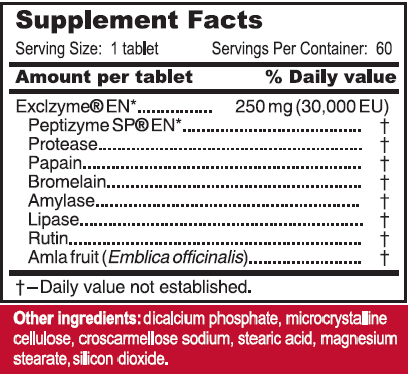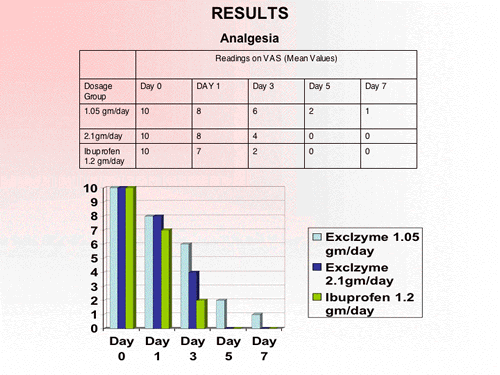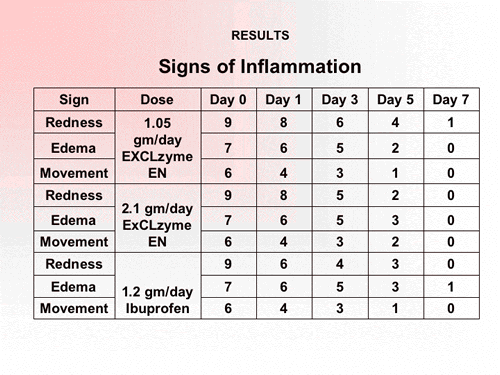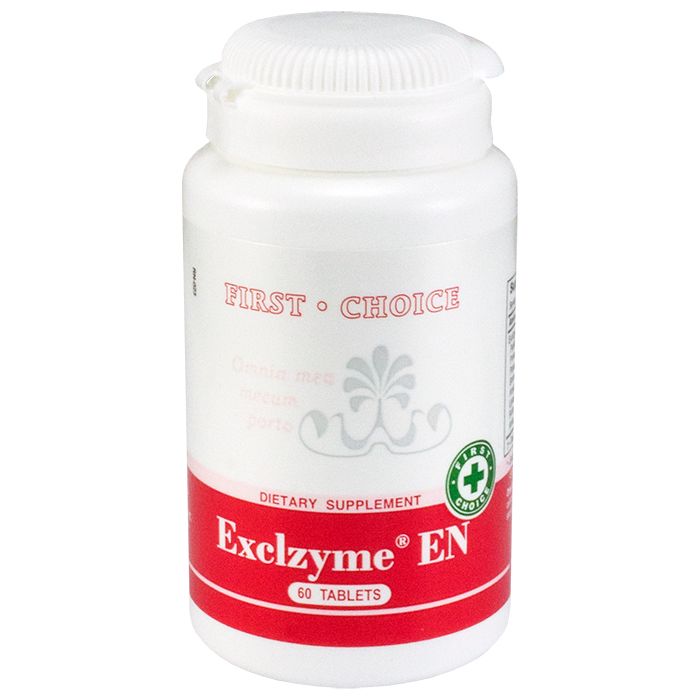Exclzyme® EN (60)
Exclzyme®EN is an exclusive formula of systemic enzymes that work synergistically; only the high quality enzymes mostly of herbal origin are used, the formula has high enzyme activity - 30,000 EU. The product has been manufactured using high quality pure raw materials and the technology that ensures all their beneficial properties intact, in strict compliance with GMP and TÜV regulations.
If you were to ask someone what enzymes are, and how they work, most people would not be able to give a correct answer, however we cannot exist without enzymes.
Enzymes are complex protein substances that participate in every chemical reaction in every cell of our body. They are essential for all metabolic, reproductive, and protective processes in the body.
Enzymes play a great role as biocatalysts – they speed up chemical reactions. Without enzymes, the chemical reactions would be too slow for life, as we know it. Millions of chemical processes in our body are taking place every second – and without enzymes, these processes would have taken hundreds of years.
More than 3000 enzymes provide normal vital functions in our body – most of them are proteolytic (protein splitting). They are produced by our body or enter with the food we eat – fresh, not thermally processed.
The enzyme is highly specific in its action. Enzymes work like a key and a lock - just as a key only works for one specifically programmed lock; an enzyme is programmed for one specific function. The human body contains a huge number of different enzymes working like clocks, providing an unlimited number of vital complicated processes.
To sustain all normal vital functions a human body needs to have an adequate number of enzymes. Nowadays almost everyone suffers from enzyme’s deficiency because of eating thermally processed food. Enzyme deficiency can happen because of genetic changes, and can cause serious health problems.
Medical scientists predict the big future in the development of the new methods of enzyme therapy in maintaining good health and wellbeing, and disease prevention.
Exclzyme®EN – is Santegra®’s exclusive systemic enzyme formula.
Only high quality, mostly plant derived enzymes are used in Exclzyme®EN. Plant derived enzymes provide a broad range of activity within the wide pH range (from 3 to 9) unlike animal enzymes.
Exclzyme®EN has high enzymatic activity – 30,000 ExcIU per one tablet.
Enzymes in Exclzyme®EN act synergistically – the phenomenon in which two or more agents acting together to create an effect greater than the predicted by the separate effects of the individual agents.
Exclzyme®EN contains:
Peptizyme SP® EN – Serrapeptase – proteolytic enzyme produced in silkworm’s stomach. Silkworms use it to dissolve cocoons in their transmutation into a butterfly.
Clinical trials proved fibrinolytic, anti-inflammatory, and anti-edematous effect of Serrapeptase.
Many clinical trials showed the effectiveness of using Serrapeptase as an anti-inflammatory agent. Its pain relieving abilities are well documented. (12, 17)
Considering these anti-inflammatory and pain relieving properties Serrapeptase is widely used as an alternative to non-steroid anti-inflammatory products.
Peptizyme SP® EN is the only enzyme in Exclzyme®EN that is sensitive to the acidic environment of the stomach, and therefore a special coat that dissolves only in the small intestine where absorption takes place protects it.
After the enzymes are absorbed in the blood stream, they spread out throughout the body, wherever they are the most needed.
Bromelain is a proteolytic enzyme extracted from the flesh and stem of the pineapple plant, Ananas comosus.
Bromelain is most notable for its effectiveness in the reduction of inflammation and decreasing swelling.
As a natural anti-inflammatory, it is widely used to reduce arthritic pain and edema. Bromelain may also be helpful for the pain, numbness, tingling, aching, and loss of motor and sensory function in the fingers resulting from carpal tunnel syndrome (CTS) (8, 9), and for prophylaxis of thrombosis (clot formations). (10) Even a small dose of bromelain is beneficial for cardio-vascular support, improves digestion, has a positive effect on metabolic functions, and helps with weight control.
Papain is one of the proteolytic enzymes found in milk juice of papaya tree (Carica papaya L.). Papain is a broad-spectrum enzyme that has a special function of splitting proteins into amino acids.
Papain:
• prevents clot formation;
• helps to speed up wound healing;
• decreases joint inflammation;
• stimulates enzymes production in the body;
• improves metabolism;
• may help lose excess weight.
Amla (Emblica, Indian gooseberry) – one of the most celebrated herbs in the traditional Indian medicine.
Amla is well known as the richest source of Vitamin C, which is resistant to storage and heat damage due to cooking. Besides that, amla contains bioflavonoids and carotenoids with antioxidant properties. Amla improves immune protection and hemoglobin synthesis. The chemicals in this plant’s fruits have a unique ability to support enzyme activity.
Rutin – bioflavonoid, with antioxidant and anti-inflammatory properties, decreases the capillary wall permeability, increases its density.
Proteolytic enzymes are perfectly digested and do not cause any side effects. Their application does not reduce the ability of pancreas to produce its own enzymes. (11)
The efficiency of enzymotherapy is confirmed by clinical researches in more than 20 different areas of medicine, including obstetrics-gynecology, urology, surgery, etc.
Exclzyme®EN helps body to support wellbeing the natural way, without negative effect of chemical substances.
* Exclzyme®EN and Peptizyme SP® EN – are registered trademarks of Specialty Enzymes and Biochemicals Co.

As a dietary supplement take 1-2 tablets twice a day with a glass of water.
Take between meals as a systemic enzyme, and with meals as a digestive enzyme.
Contraindication
Individual intolerance.
What functions do enzymes carry out inside our bodies?
More than 3000 enzymes provide a wide range of different vital functions in our bodies. One of such functions is digestion, carried out by:
• Protease - breaks down protein.
• Lipase - breaks down fats.
• Amylase - breaks down carbohydrates.
Out of three listed enzymes, Amylase participates practically only in digestion, and Protease and Lipase have systemic functions. Systemic enzymes are those that are essential not just for digestion, but throughout the whole body in every system and organ.
Major Functions of Systemic Enzymes:
Anti-inflammatory function
Enzymes are the first line of defense against inflammation. (1)
Inflammation is a reaction by the immune system to an irritation. For example, you have an injured right knee. The immune system, sensing the irritation in the knee, creates a protein chain called a Circulating Immune Complex (CIC), tagged specifically for that right knee. This CIC floats down to the right knee and causes pain, redness and swelling - the classic signs of inflammation. This, at first, is a beneficial reaction; it warns us that a part of ourselves is hurt and needs attention. However, inflammation is self-perpetuating, itself creating an irritation that the body makes CIC's to in response.
The non-steroid Anti-Inflammatory Drugs (such as Aspirin, Ibuprofen, Celebrex, Viox, etc.) all work by keeping the body from making the CIC's. This ignores the fact that some CIC's are vital for our life, like those that maintain the intestinal lining and keep the kidneys functioning. Not to mention the fact that they, along with acetaminophen, are highly toxic for the liver. Every year 20,000 Americans die from these over the counter drugs and another 100,000 will end up in the hospital with liver damage, kidney damage or intestinal bleeding caused by the side effects of these drugs. (2, 3)
Systemic enzymes are perfectly safe and free of dangerous side effects. They can see the difference between the good CIC's and the bad ones. This is due to the fact that hydrolytic enzymes are lock and key mechanisms and their "teeth" will only fit over the bad CIC's, instead of preventing the creation of all CIC's, systemic enzymes just "eat" the bad ones and in so doing, lower inflammation everywhere. (4)
Anti-Fibrosis and Blood Cleansing functions
As we grow old, enzymes production is slowed down in our body. This is because we make a finite amount of enzymes in a lifetime and we use up a good deal of them by the time we reach 40's. As a result, the repair mechanism of the body goes out of balance and has nothing to reduce the overabundance of fibrin it deposits in everything from simple cuts, to the inside of our internal organs and blood vessels. This is when most women begin to develop things like fibrocystic breast disease, uterine fibroids, endometriosis, and we all grow arterial sclerotic (scar tissue) plaque, and have fibrin beginning to spider web its way inside of our internal organs reducing their size and function over time. This is why as we age our wounds heal with thicker, less pliable, weaker and very visible scars.
Enzymes possess a unique ability to eat scar tissue and fibrosis. (5)
If we replace the lost enzymes we can control and reduce the amount of scar tissue and fibrosis our bodies have. As physicians in the US are now discovering, even old scar tissue can be “eaten away” from surgical wounds, pulmonary fibrosis, kidney fibrosis and even keloids years after their formation.
The blood is not only the river of life; it is also the river through which the cells and organs dispose of their garbage and dead material. Enzymes improve circulation by eating the excess fibrin that causes blood to get thick, creating the perfect environment for the formation of clots. All of this material is supposed to be cleared by the liver the first time it goes through but given the sluggish and near toxic states of everyone's liver these days that seldom happens. Therefore, they remain in the blood waiting for the liver to have enough free working space and enough enzymes to clean up the trash out of the blood. This can take days, and in some cases, weeks! (6)
When systemic enzymes are taken, they stand ready in the blood and take the strain off the liver by:
1. Cleaning excess fibrin from the blood and reducing the stickiness of blood cells. These two actions minimize the leading causes of stroke and heart attack causing blood clots.
2. Breaking dead material down small enough that it can immediately pass into the bowel.
Immune System Modulating
Enzymes are adaptogenic, seeking to restore a steady state to the body. (7)
When the immune system is running low we become susceptible to infectious disease, enzymes help us strengthen the immune system. When it is hyperactive, then the system creates antibodies that attack its own tissues (as in the autoimmune diseases of MS, Rheumatoid Arthritis, and Lupus). Here the enzymes would tone down immune function and eat away at the antibodies the immune system is making to attack its own tissue.
Even when the person is healthy, the organism frequently do not produce the sufficient amount of enzymes to support normal health. Moreover, if the organism is weakened or overloaded, the demand for enzymes increases dramatically.
In various diseases, traumas and inflammations, in order to get rid of products of metabolism rapidly and effectively, to release space for new cells and to accelerate the healing process, the increased amount of system enzymes required – much greater than an organism can produce.
The proteolytic enzymes are a large group of enzymes, which break down protein. In a human body, proteolytic enzymes are produced by pancreas.
The supplemental forms of enzymes may come from fungal or bacterial sources, extraction from the pancreas of livestock animals (trypsin/chymotrypsin) or extraction from plants (such as Papain from the papaya and Bromelain from pineapples).
The scientific evidence supports the use of proteolytic enzyme supplements for enhancing digestive function and for speeding recovery from injury/surgery and reducing swelling/bruising, for benefits in autoimmune diseases and food allergies.
One of the most important benefits of supplemental enzyme therapy is to improve the effect of other medical products and to reduce their side effects.
Carpal tunnel syndrome (CTS) is a neuropathy caused by entrapment and compression of the median nerve as it passes through the carpal tunnel in the wrist, leading to a decrease in nerve transmission to and from the hand. Symptoms include pain, numbness, tingling, aching, and loss of motor and sensory function in the first three digits of the hand. These symptoms are typically worse at night and can awaken the individual. CTS is more common in women than men, and is a common occurrence in occupations involving repetitive motions of the upper extremity. A vitamin B6 deficiency has been found in many patients with CTS, and treatment with B6 or its bioactive form, pyridoxal 5’ phosphate, is helpful in the majority of cases. Addressing the individual’s occupational biomechanical and/or ergonomic factors, in addition to manual manipulation and the therapeutic use of anti-inflammatory substances such as bromelain can be of significant benefit and may decrease the need for carpal tunnel release surgery. (9)
Serrapeptase has been used in the successful treatment of fibrocystic breast disease. In a double-blind study, Serrapeptase was superior to the placebo for improvement of breast pain, breast swelling and induration (firmness). 85.7 percent of the patients receiving Serrapeptase reported moderate to marked improvement. No adverse reactions to Serrapeptase were reported. Researchers concluded that Serrapeptase is a safe and effective method for the treatment of breast engorgement. (12)
Numerous researches have shown the positive effect of systemic enzymes on faster healing of traumas in sportsmen, as well as tissue restoration after surgeries. In one study of football players suffering from ankle injuries, proteolytic enzyme supplements accelerated healing and got players back on the field about 50% faster than athletes assigned to receive a placebo tablet. (13)
Due to its anti-inflammatory properties, Serrapeptase has been shown in clinical studies to benefit chronic sinusitis sufferers. In this condition, the mucus in patients’ nasal cavities is thickened and hypersecreted. This thickening causes mucus to be expelled less frequently. Japanese researchers evaluated the effects of Serrapeptase (30 mg/day orally for four weeks) on the elasticity and viscosity of the nasal mucus in adult patients with chronic sinusitis. Serrapeptase reduced the viscosity of the mucus, improving the elimination of bronchopulmonary secretions. (14)
Other clinical trials support Serrapeptase’s ability to relieve the problems associated with ear, nose, and throat infection, anosmia (loss of smell), nasal obstruction, laryngitis, difficulty in swallowing, often in just 3-4 days. Physicians assessed efficacy of treatment as excellent or good for 97.3 percent of patients treated with Serrapeptase compared with only 21.9 percent of those treated with a placebo. (15)
In patients recovering from facial and various reconstructive surgeries, treatment with proteolytic enzymes significantly reduced swelling, bruising and stiffness compared to placebo groups. (16)
German researchers conducted one double-blind study to determine the effect of Serrapeptase on post-operative swelling and pain. This study involved sixty-six patients who were treated surgically for fresh rupture of the lateral collateral ligament of the knee. On the third post-operative day, the group receiving Serrapeptase exhibited a 50 percent reduction of swelling, compared to the controls. The patients receiving Serrapeptase also became pain-free more rapidly than the controls, and by the tenth day, the pain had disappeared completely. (17)
Hans A. Nieper, M.D., an internist from Hannover, Germany, studied the effects of Serrapeptase on plaque accumulations in the arteries. The formation of plaque involves deposits of fatty substances, cholesterol, cellular waste products, calcium and fibrin (a clotting material in the blood) on the inner lining of the arteries. Excessive plaque results in partial or complete blockage of the blood’s flow through an artery, resulting in arteriosclerosis, and potentially a stroke or heart attack. According to Dr. Nieper, 30,000 I.U. of Serrapeptase per day for 12 to 18 months is sufficient to remove fibrous blockages from constricted coronary arteries, as confirmed in many of his patients by ultrasound examination.
In one of researches it was established, that oral proteolytic enzymes intake is as effective treatment of herpes, as standard medicamentous treatment (acyclovir (Zovirax)). (18)
Proteolytic enzymes are successfully applied for treatment of hepatitis C patients, and that is confirmed by laboratory researches. (19)
The study conducted to determine the positive effect of Exclzyme®EN for reduction of inflammation and painful sensations.
In the single blind controlled parallel research 100 patients with inflammatory processes of a traumatic, infectious, post operational and dental origin took part. In research, various dozes of Exclzyme®EN were applied.
Effect of Exclzyme®EN on reduction of painful sensations, inflammatory process, side effects, improvement of blood work results and mobility in relation to control group was observed.
The results of the research:
Pain-relieving action:
Subjective painful sensations while using Exclzyme®EN (2.1 g/per day) and Ibuprofen (1.2 g/per day) were identical in the beginning of the experiment, and have completely stopped in both groups on the fifth day. (pic. 1)

Pic. 1 Anti-inflammatory action:
As you can see from the table (pic.2), on the seventh day of the research the patients, who took Exclzyme®EN (daily dose of 2.1 g.) showed, that all signs of inflammation (redness, edema, pain at movement) had disappeared. While in the group of patients who took Ibuprofen (1.2 g. a day) there was edema (in one case), and with Exclzyme®EN (1.05 g. per day) – redness (in one case). 
Pic. 2 The conclusion:
Exclzyme®EN is effective in reduction of painful sensations and inflammation. Side effects were not observed. (20)
1. Carroll A., R.: Clinical examination of an enzymatic anti-inflammatory agent in emergency surgery. Arztl. Praxis 24 (1972), 2307.
2. Celebrex article Wall Street Journal 19 April 1999.
3. No author listed: Regular Use of Pain Relievers Can Have Dangerous Results. Kaleidoscope Interactive News, American Medical Association media briefing. July 24, 1997.
4. Enzymes - A Drug of the Future, Prof. Heinrich Wrba MD and Otto Pecher MD. Published 1993 Eco Med.
5. Kakinumu A. et al.: Regression of fibrinolysis in scalded rats by administration of serrapeptase. Biochem. Pharmacol. 31:2861-2866,1982.
6. Ernst E., Matrai A.: Oral Therapy with proteolytic enzymes for modifying blood rheology. Klin Wschr. 65 (1987), 994.
7. Kunze R., Ransberger K., et at: Humoral immunomodulatory capasity of proteases in immune complex decomposition and formation. First International symposium on combination therapies, Washington, DC, 1991.
8. Kelly, G.S. "Bromelain: A Literature Review and Discussion of Its Therapeutic Applications." Alternative Medicine Review (November 1, 1996).
9. Alan L. Miller, N.D. and Timothy C. Birdsall, N.D Etiology and Conservative Treatment of Carpal Tunnel Syndrome Alt Med Rev 1997;2(1):26-35)
10. Metzig, C et al Bromelain Proteases reduce human platelet aggregation in vitro, adhesion to bovine endothelial cells and thrombus formation in rat vessels in vivo. In Vivo 13 (1): 7-12 Jan-Feb 1999.
11. Friess H, et al.: Influence of high-dose pancreatic enzyme treatment on pancreatic function in healthy volunteers. Int J Pancreatol 1998;23:115-23
12. Kee W., H. Tan S, L., Lee V. Salmon Y. M.: The treatment of breast engorgement with Serrapeptase: a randomized double blind controlled trial. Singapore Med J. 1989:30(l):48-54.
13. Buck JE, Phillips N. Trial of Chymoral in professional footballers. Br J Clin Pract.1970 Sep;24(9):375-7.
14. Department of Otorhinolaryngology, Mie University School of Medicine, Japan. The effect of an orally administered proteolytic enzyme on the elasticity and viscosity of nasal mucus. Arch Otorhinolaryngol. 1988;244(6):355-9.
15. Mazzone A, et al.: Evaluation of Serratia peptidase in acute or chronic inflammation of otorhinolaryngology pathology: a multicentre, double blind, randomized trial versus placebo. J Int Med Res. 1990; 18(5):379-88.
16. Duskova M, Wald M. Orally administered proteases in aesthetic surgery. Aesthetic Plast Surg. 1999 Jan-Feb;23(1):41-4.
17. Esch PM, Gerngross H, Fabian A, Reduction of postoperative swelling objective measurement of swelling of the upper ankle joint in treatment with serrapeptase. Fortachr Med,107(4):67.8, 71-2 1989 Feb 10
18. Kleine MW, et al.: The intestinal absorption of orally administered hydrolytic enzymes and their effects in the treatment of acute herpes zoster as compared with those of oral acyclovir therapy. Phytomedicine 1995;2:7-15.
19. Kabil SM, Stauder G: Oral enzyme therapy in hepatitis C patients. Int J Tiss React 1997;19:97-8.
20. Dr. V. Patki, Exclzyme EN, Clinical Efficacy, Clinical Pharmacologist

